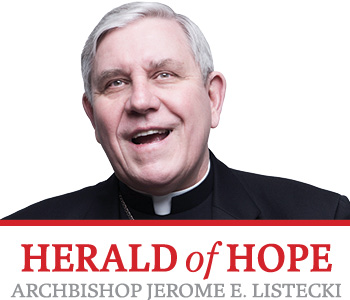Herald of Hope
Many people will tell me if you have your health, you have everything. Wealth, fame and bodily pleasures now take a back seat in the pursuit of life’s goals because one physically cannot enjoy them. Relationships become more important, time is a precious commodity, and there is so much to say and convey in so short a span.
It is no wonder that we make special efforts to stay healthy — we take vitamins, we exercise, diet and visit our doctors for annual checkups. There should also be a reminder that we express our love and appreciation to spouses, family and friends. If God called you now, would they know how much you loved them and appreciated sharing their life with you?
I remember a friend of mine had graduated from college and, as a postgrad before starting her career, she was traveling through Europe. She was returning home from the Paris airport, and the plane she was flying in had been in the air for no more than 15 minutes when the pilot announced they would be returning to the airport because there was a report that a bomb was aboard. My friend told me, after a prayer, she had hoped that she told her mother and father last night when they talked that she loved them. It was a great lesson. Life can change in an instance; always make sure our loved ones know the depth of our love and appreciation for them.
I would offer that there is something which is even more important than our physical health, and that is our spiritual health. I have, at times in my priesthood, encountered individuals who have neglected their spiritual health. Now faced with the inevitability of a life-ending disease, there is a reaching out to anyone who might offer consolation and hope for a life yet to come. I remember once in a spiritual counseling session a man dying from cancer who told me that he had turned his back on God and now feels like a hypocrite seeking his assistance. I assured him that he might have turned his back on God, but God never abandoned him and welcomes him no matter what the circumstances. He wanted to know what he should do.
I told him the formula was simple: go to Mass on Sundays, pray every day and go to confession. I challenged him to do it now and not wait. Reconciliation offers a new beginning. His physical life continued to deteriorate but his spiritual life grew stronger with the passing of each day. He went to Mass not only on Sundays but every day, no matter how difficult and painful. He prayed and shared prayer with his wife, and confession was a regular occurrence.
In his book, “The Gift of Peace,” Cardinal Joseph Bernardin invites individuals to accompany him as he reflects on the last three years of his ministry before succumbing to pancreatic cancer. He often encouraged people to develop their prayer life before the physical suffering interferes with their prayerful communication with God. He embraced death as a friend who led him to a transition to the life promised by our Lord. His successor, Cardinal Francis George, often spoke to me of his admiration for Cardinal Bernardin, who was dying publicly. Most of us see this moment as an intimate and private time. To do so publicly takes courage and a witness of our faith.
Ironically, Cardinal George would be called to do the same, and he did so with the same courage. This was not the Lord Jesus who just suddenly popped into their lives. It was a Jesus who walked every day with them and whom they encountered in their prayer. This was the Jesus to whom they joined their sufferings. In his own words, Cardinal Bernardin stated, “As Christians, if we are to love as Jesus loved, we must first come to terms with suffering. Like Jesus, we simply cannot be cool and detached from our fellow human beings. Our years of living as Christians will be years of suffering for and with other people. Like Jesus, we will love others only if we walk with them in the valley of darkness — the dark valley of sickness, the dark valley of moral dilemmas and the dark valley of oppressive structures and diminished rights.”
Lent is a spiritual time presented to us when, through prayer, fasting and almsgiving, we deepen our relationship with the Lord. It is a time to examine our lives and attempt to remove the sins that persist in our lives. Through Reconciliation, we receive God’s mercy and forgiveness, calling us to do the same for those who have wronged us. We walk with Jesus to Calvary, realizing he carries the cross for us. We prepare for our own death by suffering and dying with him. It is only through this transformative power of God’s love and sacrifice that we can embrace a life everlasting.
Resolve to attend Mass and encounter his Real Presence. Celebrate the Sacrament of Reconciliation, the grace of his forgiveness and mercy. The Archdiocese of Milwaukee provides opportunities to all the faithful with 12 hours of Reconciliation on March 29 in every deanery. Make time for prayer daily and if possible, pray with family. When you are fasting or abstaining, do it intentionally, not just as a routine but understanding that it is done for Jesus and his Church. When giving alms, realize that you are sharing blessings given to you by God with those in need. There is no doubt the incorporation of these actions will assist you in your spiritual health and prepare you to enjoy the life offered to those who believe and trust in Jesus.

